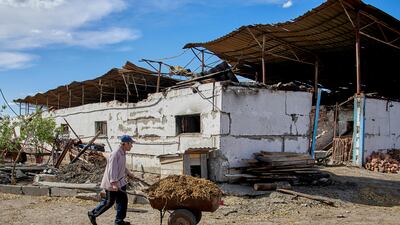Live updates: follow the latest news on Russia-Ukraine
The G7 countries promised on Saturday to use their economic might to tackle global food shortages resulting from Russia’s invasion of Ukraine.
Foreign ministers from the club of rich democracies said Russia was blocking grain exports from Ukrainian ports, turning the war between two major agricultural producers into a potential global food crisis.
In a statement after three days of talks in Germany, they said their countries — Britain, France, Germany, Italy, the US, Canada and Japan — would “reinforce our contributions” to aid providers such as the World Food Programme.
They said the G7 would launch a dedicated global food security alliance at a meeting of the group’s development ministers this month, and work to unblock exports from Ukraine’s war-torn Black Sea ports.
Annalena Baerbock, the German Foreign Minister chairing the G7 talks, accused Russia of deliberately engineering a food crisis to undermine international solidarity over the war in Ukraine.
“We cannot be naive. This is not collateral damage. It is a consciously chosen instrument in a hybrid war,” said Ms Baerbock, who said exports of millions of tonnes of grain could begin tomorrow if Russia permitted it.
She told a post-summit press conference that humanitarian aid would quickly be made available to the most vulnerable countries and regions so that the food crisis could at least be eased.
“This is the Russian president’s war, but we have a global responsibility,” said Ms Baerbock, who accused Moscow of falsely claiming that western sanctions were to blame for food shortages.
The WFP recently said that 47 million people would be thrown into acute hunger if the fallout from the war in Ukraine is not addressed, with Sub-Saharan Africa at particular risk. It said Ukrainian exports typically feed about 400 million people.
Food shortages have also reached western supermarkets, with sunflower oil being rationed because of the supply shortfall from Ukraine.
Ukrainian President Volodymyr Zelenskyy said last week that merchant traffic in the port of Odesa, recently hit by Russian missiles, had ground to a halt for the first time in decades.
The G7 ministers called for the establishment of “solidarity lanes” to allow grain to be exported by other routes, an idea floated this week by the European Union.
Exporting food over land is complicated because Ukrainian railway carriages are not compatible with most of the EU’s rail wagons, and thousands of wagons and lorries are waiting for clearance on the Ukrainian side.
The G7, which met in north Germany with the foreign ministers of Ukraine and Moldova as guests, said food insecurity was being worsened by rising food and fuel prices which have been exacerbated by the war in Ukraine.
“This is having devastating consequences for some of the most vulnerable people and rising costs also make it harder for humanitarian and development agencies to deliver assistance to those in greatest need,” their statement said.
“We are determined to contribute additional resources to and support all relevant efforts that aim to ensure availability and accessibility of food.”
In the longer term, they said they would try to avoid such crises arising in future by reducing food waste, increasing their own food production and pushing for more sustainable agriculture around the world.
A broader statement on the war said the G7 powers would “never recognise” any attempt by Russia to redraw international borders by force, and promised to “further increase economic and political pressure on Russia”.
The countries said they would speed up efforts to rid Russian energy from their power grids. The EU, which attends G7 meetings, is currently locked in a political struggle over a proposed ban on Russian oil.





















